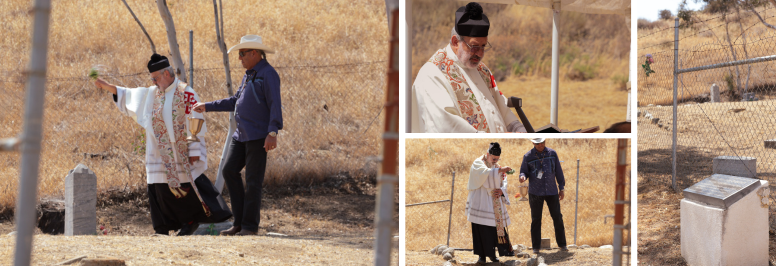St. Boniface School and Cemetery in Banning was reconsecrated by Father Stephen Porter, S.T.L., on June 25 in a collaborative effort with the Morongo Band of Mission Indians, who wished to preserve and honor those buried at the long-abandoned property as new housing construction continues to take place around it.
“We come here today to reconcile this cemetery, which has been abandoned for so long, uncared for so long, and souls and bodies of those souls resting need our prayers,” said Fr. Porter, Parochial Vicar at Saint Kateri Tekakwitha Parish, during the reconsecration.
St. Boniface opened in 1890 and for the following 62 years it operated as a place to educate and assimilate Native American children into Anglo culture. The Catholic Church has acknowledged that some practices used at industrial schools like St. Boniface were inhumane and would not be done today.
“So that’s what we do today as we bless this land back to God as the final resting place of so many and ancestors of so many of you,” Fr. Porter said.
The school property also includes a cemetery where diocesan records show 77 people were buried, including 24 Native American and Hispanic children who had attended the school. Former students of the school were also in attendance to witness the reconsecration.
“It’s good what we are doing, this is beautiful,” said Deacon Andrew Orosco, who serves at St. Joseph Mission in San Jacinto. “Being native, being clergy, a deacon, it just melds the two together. It shows the importance of the recognition of one with the other. It’s very special.”
Noticing the abandonment of the cemetery and land, Deacon Orosco was happy that those individuals were being recognized and blessed by the church.
“The last time I was up here, maybe a year and a half ago, I saw how lonely it was and I’m glad someone recognized that, ‘yeah it’s lonely, but now it’s time to recognize its existence and the people that lay and rest here, they lie and rest here for eternity so it’s good that we as a native people, we as a Church recognize those individuals,” Dcn. Orozco said.


